Frogsong is a top-down action and adventure videogame that follows the struggles of a young tree frog to find acceptance in a world suffocated by tradition and threatened by imperial expansion. I play as Chorus, who at the story’s beginning travels across a land called Salia to their new home in the village of Boreala. There they plan to join the Defense Guild, a group of warrior frogs who defend Salia from threats. Chorus’ arrival is an unpleasant one; they arrive alongside Lord Lithos, a massive bully of a frog who pressures Boreala and other frog communities to join the Taural Empire. Countering Lithos’ efforts will take the skills of the Defense Guild, but Chorus’ admittance is blocked by its leader, Basalt, who believes Chorus’ small size would make them a liability. Over the course of a few days, Chorus must prove themself to Basalt and prevent Lithos from adding their new home to his empire.
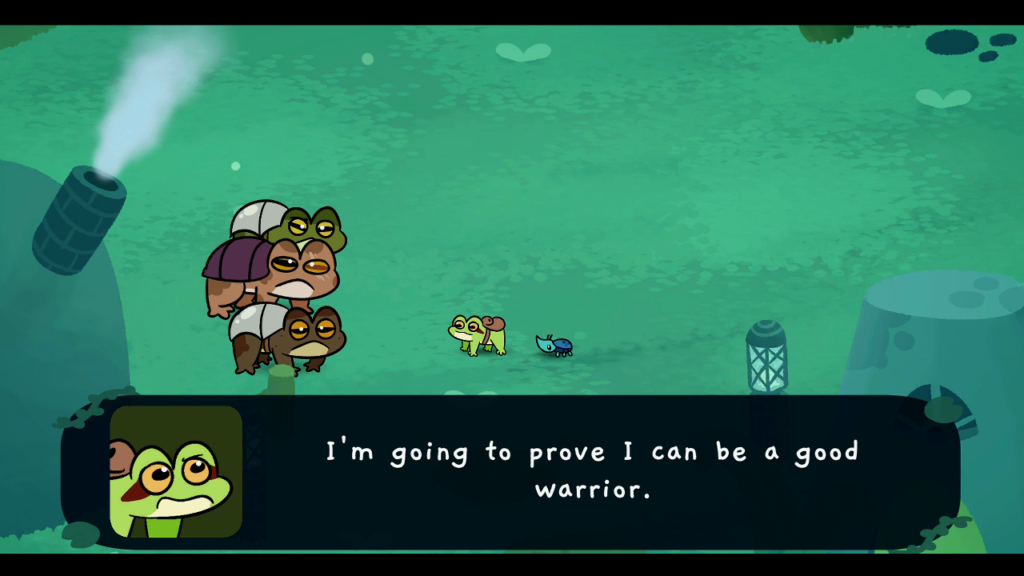
Frogsong opening midway through Chorus’ journey to Boreala is a smart one. It drops me straight into its emphasis on journeying the great distances between Salia’s five communities.
The lush areas connecting the communities are long and winding. They are open—Chorus is free to walk back and forth along them—but they are also frustratingly linear. There is little to actually explore. It takes me about five hours to finish Frogsong’s campaign. That time is mostly spent delivering messages and running errands for Boreala’s citizens by guiding Chorus along circuitous routes from Point A to Point B. Removing the many empty, meandering, tunnel-like areas would cut the playtime by more than half.
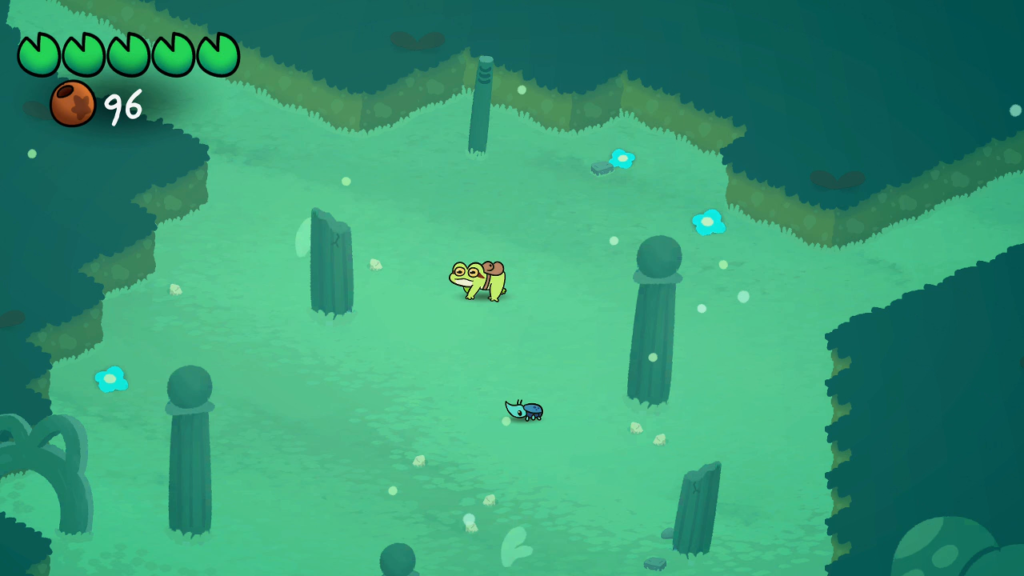
One travel convenience I like is a dedicated map button which overlays a translucent image of the world over the screen when it is pressed. As a compulsive map checker, I appreciate how this lets me track Chorus’ progress to their destination without constant visits to a submenu disrupting my flow. I would appreciate this feature even more if the world was complicated enough to require a map to navigate.
In addition to being empty, the environments are uninteresting to look at. Each area is color coded. The forests around Boreala are deep green. West of Boreala is Copper City, surrounded by fields of golden-brown grass. The north of Salia is dominated by The Gloaming Grove, where the color purple abounds. I can tell from a single image where Chorus stands in the world by looking at its predominant color, but this color is almost all I see. Walking the lingering path from Boreala to the Defense Guild’s training area feels even longer when the only sights along the way are the same expanses of green grass, the same curled green leaves, and the same green moss-covered statues repeated ad nauseam.
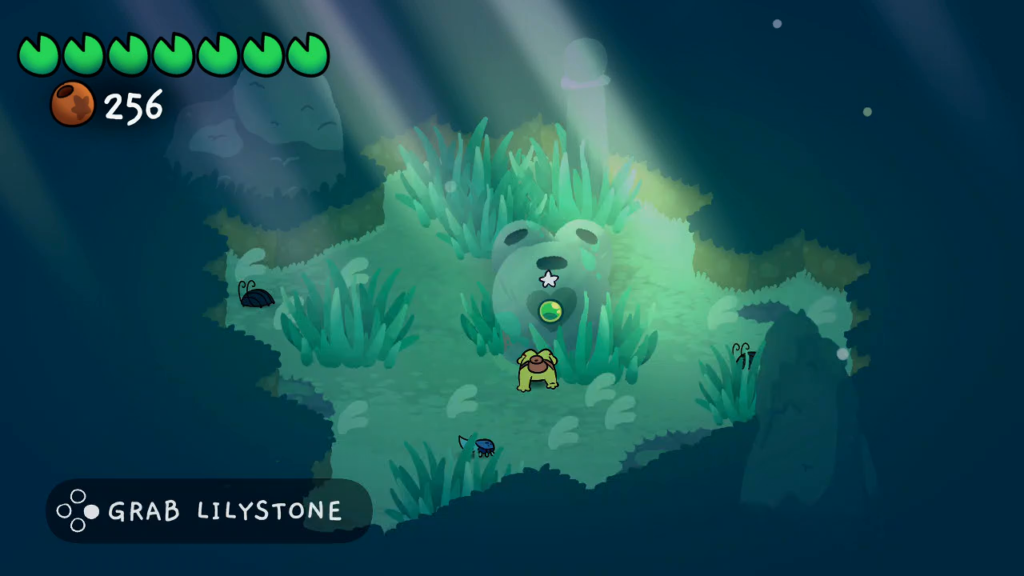
Salia is not devoid of secrets. Hidden at the ends of its few branching paths are eight Lilystones. Collecting one of these magical green pebbles increases Chorus’ Will, allowing them to take more hits in combat. For many of these Lilystones, finding the dead end slightly off the main path where it is sequestered is the only challenge in obtaining them. Others are further concealed by puzzles which must be solved to reveal the Lilystone. These handful of mysteries are the most engaging moments in Frogsong and are far too few. The adventure otherwise provides little in the way of interest, let alone friction. Most of Chorus’ quest is completed by walking.
The only speedbumps that trouble Chorus’ marches between Salia’s communities are hostile insects. Varieties of beetles, flies, and bees appear in nearly every area and attack Chorus when they pass nearby. There is no narrative reason given for the presence of these bugs; they are apparently wild animals that exist for no reason other than to have enemies to fight. Even though the conflict centers on an expanding empire, with a few exceptional boss fights, combat remains focused on random hostile insects throughout the adventure. Frogsong is maybe too gentle and too timid to suggest physical violence might be a viable solution to conquest brought by other frogs. Violence is best meted out against wild creatures with no sentience and only the most extreme of authoritarian conquerors.
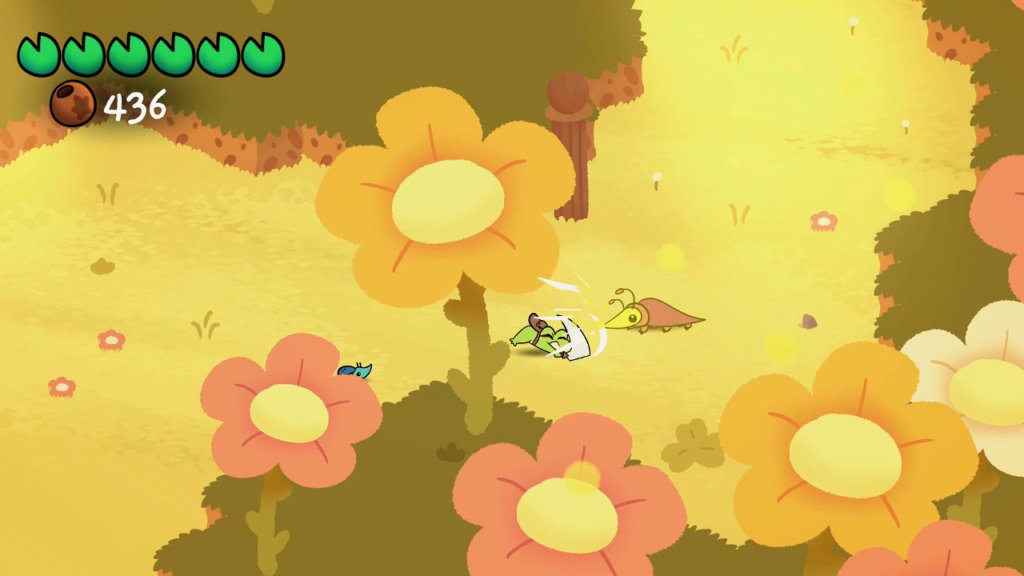
To defend themself against the hostile bugs, Chorus carries a small blade. There’s a learning curve to using this weapon. Its tiny reach often results in the player character taking a hit from an enemy when they try to attack. I must teach myself to let an enemy approach Chorus and time their attack to push the enemy away. Aggressive play puts them at risk of unnecessary damage to their Will. This becomes less of a problem as Chorus accumulates more Lilystones, letting them absorb more hits before reaching a game over. If Chorus does run out of Will, it is a minor setback. Checkpoints marked by halos of sunlight cutting through the dense foliage are plentiful.
The difficulty is further simplified as Chorus’ blade is upgraded three times over the story’s course. When fully upgraded, the blade can defeat most hostile enemies in just a few swings. Like the Lilystones, little effort is needed to obtain these upgrades. Two become available in the normal course of the plot. Only the final upgrade requires a little extra effort and exploration to obtain. Once fully kitted out with all eight Lilystones and three sword upgrades, every obstacle before Chorus may be removed by holding forward and mashing the attack button.
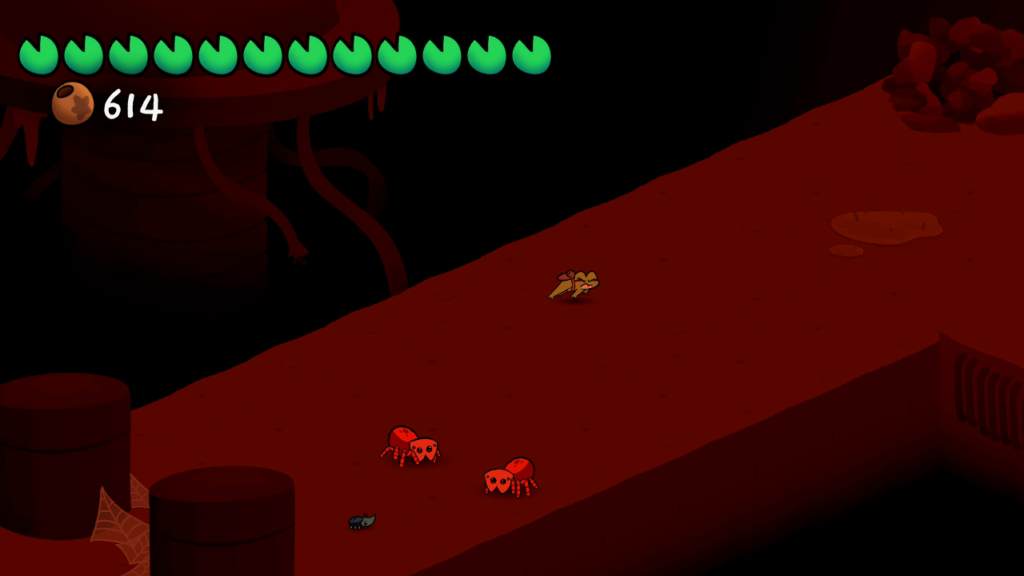
Even this approach may not be worth the time because nearly every enemy in Frogsong may be run past. Being a frog, Chorus is equipped with a dedicated hop button that propels them a short distance forward. The intended use of this ability may be to dodge away from enemy attacks. In practice it is much more useful for quickly moving across the screen, hopping straight past enemies to the next area. Wild bugs do drop coins when they are defeated, but these are mostly used to buy food that restores Chorus’ Will. Chorus rarely gets hit if they’re running past every enemy in their way, so there’s little need to buy food. Frogsong provides few reasons to engage with its combat mechanics at all.
Frogsong does come replete with one of the most comprehensive suites of accessibility features I’ve encountered in a videogame for some time. The most impactful is the addition of BeetleBud, a tiny beetle Chorus discovers on their way to Boreala.
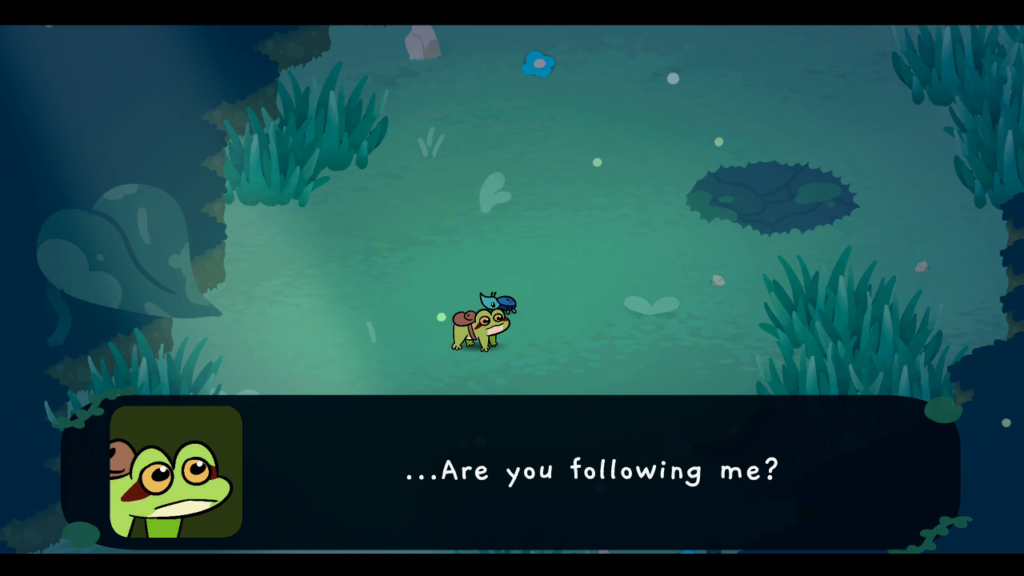
BeetleBud can be released from Chorus’ bag at any time and assists with some of the main activities. When Chorus passes by a secret passage or clue in the environment, BeetleBud will highlight it with frantic buzzing and flapping of their wings. They also assist in combat, though “assist” is a misnomer. They attack with such ferocity and speed that they end up doing far more damage than Chorus. BeetleBud takes what little interactivity Frogsong has and reduces it down almost to the level of autoplay. Thankfully, using this companion is completely optional.
Other accessibility features let me control graphical elements like screen shake and lighting effects which may be distracting or painful to some. I can also choose from five different typefaces which may be easier to read for different players. Assists let me toggle on hints for solving puzzles and provide Chorus regenerating health. If regenerating health isn’t enough for a player, Chorus can also be made outright invincible.
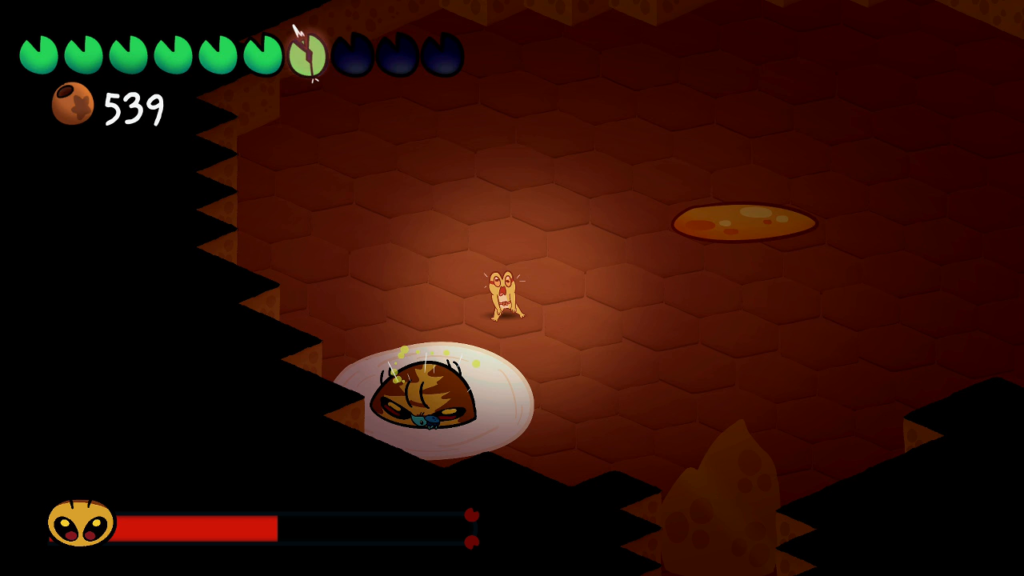
The final accessibility toggle is for content warnings. Frogsong’s videogame design does little to surprise me. From its storefront description and accompanying images, I deduce that it is an adventure videogame with sword combat inspired by The Legend of Zelda. This is it exactly. What is unexpected is how queer it is. The way Chorus is treated and how they respond is the part of Frogsong that will stick with me, and the further into the story I go the more I understand the presence of content warnings.
At first, Chorus’ story seems like a standard tale of an underdog trying to prove their worth. When they first meet the other members of the Defense Guild, each fully four times Chorus’ size, they seem taken aback that this is their newest recruit. Chorus’ size is always the issue which is raised when they are doubted by non-player characters. Most of those in Boreala and the Copper City assume that Chorus is a priest and not a warrior.
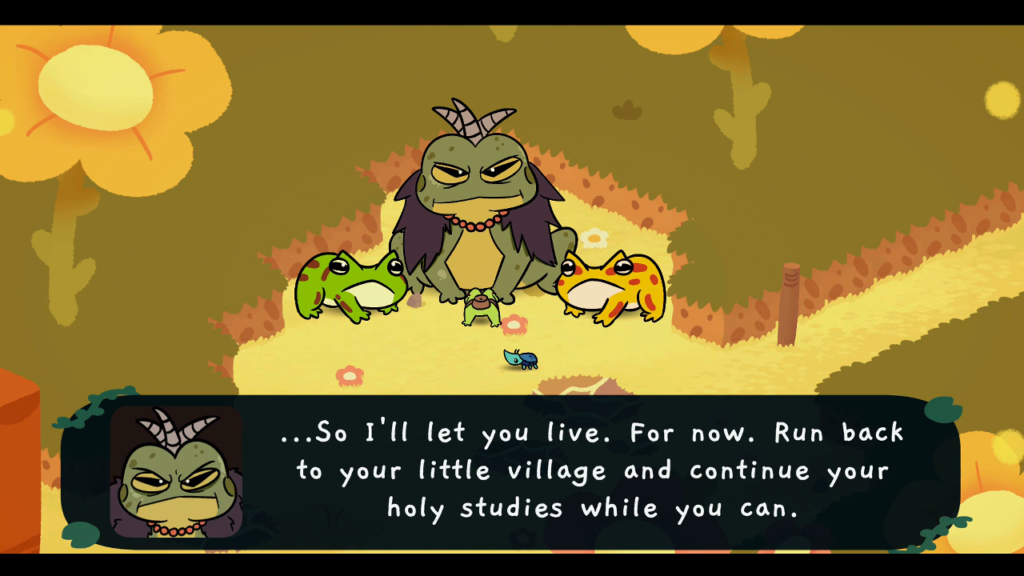
It’s when Chorus is tasked by Boreala’s elder with warning their hometown, Tennsfall, about the encroaching Taural Empire that my perception of their story changes. Up until that point I am able to see how their struggles might work as a queer story, but it is not necessarily the intended message. It is what Tolkien described as the difference between “applicability” and “allegory.”
When Elder Acris treats Chorus with paternal disdain, inviting them to return to Tennsfall “when you are done playing soldier,” my suspicions grow from an inkling to a scratching. When Chorus’ protests towards this treatment are answered with gaslighting, my realization is almost fully formed. When another, nameless Tennsfall NPC recognizes Chorus but forgets their “new name,” Chorus’ increasingly annoyed reactions to their apologies is unmistakable. Chorus is accustomed to being deadnamed and finds others’ repeated apologies for it more grating than being incorrectly addressed, an event I have witnessed firsthand with my own trans friends. The events in Tennsfall take the queer applicability I sense in Frogsong’s first half and make it obvious allegory.
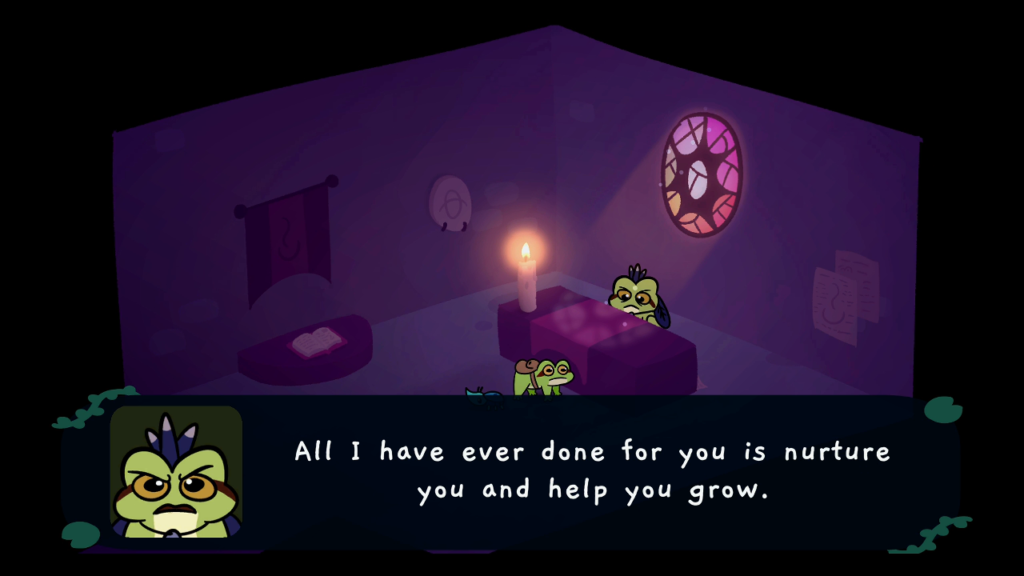
Once Frogsong’s queer theme has been thrust into the forefront, I find myself with a question: Is this the best way to tell this kind of story? Chorus’ struggle to be accepted in their queer identity is re-coded into one that focuses on their occupation. I cannot deny that it works from a broad perspective. Their decision to join the Defense Guild is dismissed based on their size. Even frogs who seem well-meaning are careless about how they speak to Chorus because they have internalized how other frogs should be addressed by their appearance. But I do wonder if the message is muddled when it is rendered as “I am inspired to be a soldier and a protector despite my size” instead of “I feel that a biological or cosmic mistake has born me into a body that is not my own.”
The question may be moot. Chorus proves beyond any doubt that their body does not dictate their ability or their identity. By the time Frogsong is over, they have found acceptance in their new community and proved who they really are.
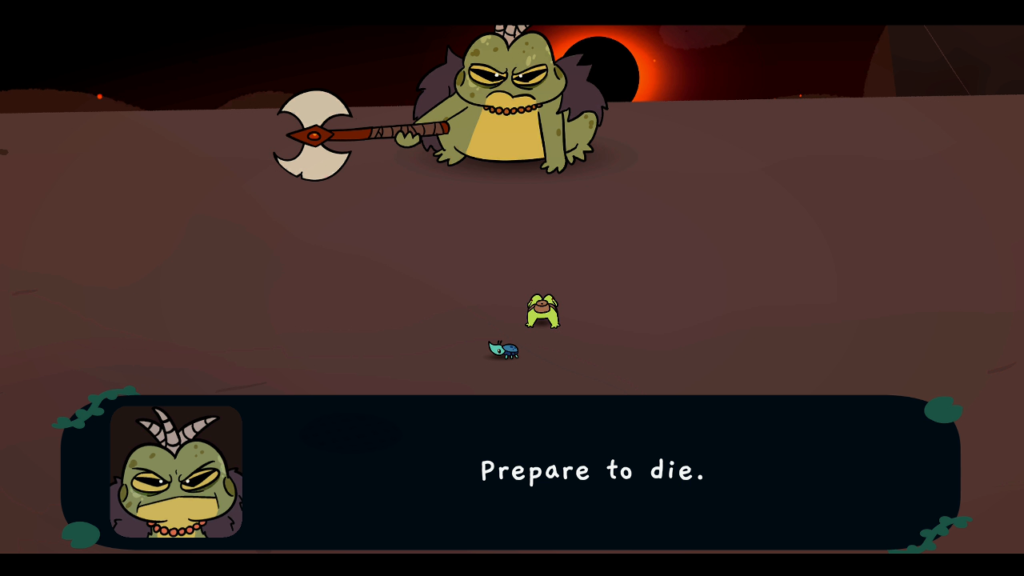
As an action and adventure videogame in the spirit of classic The Legend of Zelda, Frogsong is, in bluntest terms, basic and boring. Its open world consists of meandering paths with little to discover. There are a few hidden collectibles and upgrades, but far too few and most take little extra effort to locate. Its combat is rudimentary and most enemies can simply be run past with minimal penalty. Yet Frogsong’s queer theme is a notable strength which precludes me from dismissing it completely. I am uncertain if it is fully successful in re-coding its queer message into a broader idea of occupational aspiration, but I appreciate its effort. In the end, I am still glad that I played Frogsong.